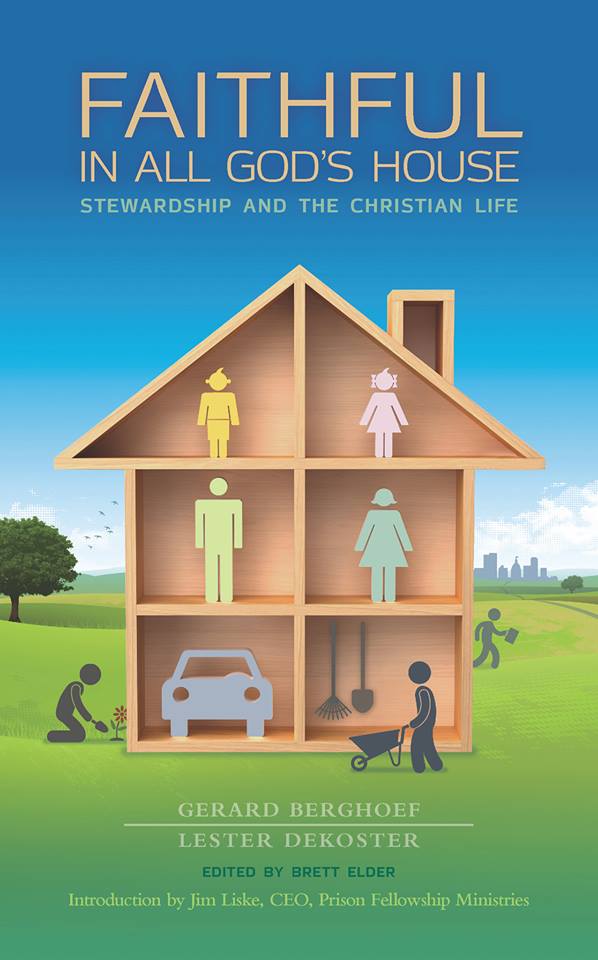“Stewardship is far more than the handling of our money. Stewardship is the handling of life, and time, and destiny.” –Lester DeKoster and Gerard Berghoef
 Stewardship as a term is tossed around rather widely and routinely, and even (or especially) in church settings, its presumed definition is often surprisingly narrow. Though often used in reference to tithing, fundraising, or financial management (and rightly so), we mustn’t forget that at a more basic level, stewardship is simply about our management of God’s house. All of his house.
Stewardship as a term is tossed around rather widely and routinely, and even (or especially) in church settings, its presumed definition is often surprisingly narrow. Though often used in reference to tithing, fundraising, or financial management (and rightly so), we mustn’t forget that at a more basic level, stewardship is simply about our management of God’s house. All of his house.
“God makes man the master of his temporal household,” write Lester DeKoster and Gerard Berghoef in Faithful in All God’s House. “Like all stewards, man is not the owner. He is the overseer…The quality of stewardship depends on obedience to the Master’s will.”
As Evan Koons learns in Episode 1 of For the Life of the World: Letters to the Exiles, our various earthly economies— or the “modes of operation that God has designed us to work within” — include our families, jobs, governments, schools, charities, and institutions. Each area has its own distinct role, its own distinct “sound,” its own mode of operation. But each was meant to played in harmony with others. God calls us to be stewards across all of life, and assuming that responsibility begins with expanding our imaginations.
Over at Oikonomia, the Acton Institute’s new blog at the Patheos Faith and Work Channel, the first chapter of Faithful in All God’s House is offered in full, helping lay a basic foundation on how we might consider the reach of these things.
Although DeKoster and Berghoef highlight several areas, they conclude that the “basic form of stewardship is daily work, no matter what that work may be.” Whether digging ditches, analyzing data, caring for kids, volunteering in the community, or engaging in scholarship, the work of our minds, hearts, and hands is not our own, and must be rendered in obedience to God. (Our play, not just our work, must be rendered to God as well. But more on that in the excerpt.)
For kicks, an excerpt of the excerpt:
Work is the fundamental form of stewardship because:
God himself works: “My Father is always at his work to this very day, and I, too, am working” (John 5:17), the Lord says. It is not recounted that God plays, but he works. That is to say, God is ever-busy making provision for our existence. Work is that which serves another. Play is that which serves ourselves.
Work knits the fabric of civilization. We take for granted all the possibilities which work alone provides. And we become aware of how work sustains the order which makes life possible when that order is rent by lightning flashes of riot or war, and the necessities which work normally provides become difficult to come by…
…It is of the nature of work to serve the community. Whether work is done in the home, on the land, or in the countless forms of enterprise developed across the centuries, work is doubly blessed: (1) it provides for the family of man, and (2) it matures the worker.
Work matures the worker because it requires ethical decision. Merely to rise to one’s daily tasks requires an act of will, a decision to serve the community, however reluctantly, however unaware the worker may be that such is the case. Such willed acts of service not only make and sustain the fabric of civilization and culture, but also develop the soul. And, while the object of work is destined to perish, the soul formed by daily decision to do work carries over into eternity…
…The forms of work are countless, but the typical one is work with the hands. The Bible has reference to the sower, to the making of tents and of things out of clay, to tilling the fields and tending the vine. Handwork makes visible the plan in the mind, just as the deed makes visible the love in the heart. While the classic Greek mind tended to scorn work with the hands, the Bible suggests that something about it structures the soul…
…Seen in this light, which is the light shed by the Bible on work, it is easy to understand why work is the primary form of stewardship. To work, most of us give the largest unit of our lives. By work, we together raise the level of our culture, keep its order, supply its needs, and point to its promise of better living for more of the world’s peoples.
For the believer; then, stewardship begins with the day’s work. Done well, as unto God, in the full knowledge that by work the world lives, work serves God and man and the self.
For more, see Faithful in All God’s House and other titles on stewardship from the Acton Institute and Christian’s Library Press.

